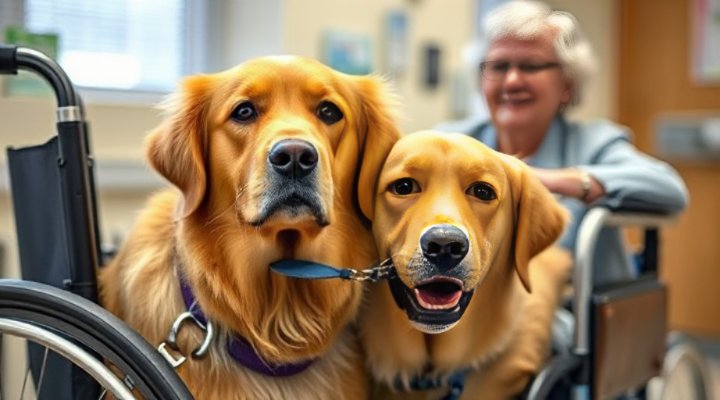Therapy dogs provide an invaluable service by offering comfort and emotional support in hospitals, schools, nursing homes, and disaster areas. Unlike service dogs who assist individuals with disabilities, therapy dogs work with many people to improve their emotional well-being. Becoming a certified therapy dog requires specific training and temperament evaluation. This guide will walk you through every step of the process.

Understanding Therapy Dog Requirements
Before beginning training, it’s crucial to understand what makes a good therapy dog candidate. The ideal therapy dog possesses:
- A calm, friendly temperament
- Basic obedience skills
- Comfort around strangers and unusual environments
- Reliability in various situations
Many organizations, like the American Kennel Club, provide excellent resources about therapy dog qualifications. Additionally, our article on dog recall training can help strengthen your dog’s basic skills.
Step 1: Assess Your Dog’s Temperament
Not every dog is suited for therapy work. Begin by honestly evaluating your dog’s personality. A good therapy dog candidate should:
- Remain calm in new situations
- Enjoy meeting new people
- Not startle easily at loud noises or sudden movements
- Be comfortable being touched all over
If your dog shows signs of aggression or excessive shyness, they might not be suitable for this work. Consider our guide on managing dog aggression if you’re dealing with behavioral issues.

Step 2: Master Basic Obedience
Before specializing in therapy work, your dog must have excellent basic obedience skills. They should reliably respond to:
- Sit
- Stay
- Down
- Come
- Leave it
- Loose leash walking
Our easy tricks to teach your dog article provides great foundation exercises. Remember, therapy dogs often work around vulnerable populations, so impeccable manners are essential.
Advanced Training for Therapy Work
Beyond basic commands, therapy dogs should:
- Ignore food on the floor (critical in medical settings)
- Remain calm around medical equipment
- Accept hugs and petting from strangers
- Stay focused despite distractions

Step 3: Socialization and Exposure
Therapy dogs encounter diverse environments. Gradually expose your dog to:
- Wheelchairs, walkers, and canes
- Hospital equipment (IV poles, beeping machines)
- Crowds of people
- Different floor surfaces
- Elevators and automatic doors
The Americans with Disabilities Act website offers insights into accessibility equipment your dog might encounter. Positive experiences during this phase are crucial for building confidence.
Step 4: Certification Process
While requirements vary by organization, most therapy dog certification processes include:
- Health clearance from your veterinarian
- Passing the Canine Good Citizen test
- Specialized therapy dog evaluation
- Handler education course
Many hospitals and facilities require certification through recognized organizations like Therapy Dogs International or Pet Partners.

Maintaining Therapy Dog Skills
After certification, ongoing training is essential. Regular practice should include:
- Monthly obedience refreshers
- Continued socialization
- Monitoring for signs of stress
- Keeping vaccinations current
Remember, therapy work should always be positive for your dog. If they show reluctance, it’s okay to take a break. Our article on house training an adult dog demonstrates how patience leads to success in all training.
The Joy of Therapy Work
Becoming a certified therapy dog team is incredibly rewarding. You’ll witness firsthand how your dog’s presence can:
- Reduce stress and anxiety
- Lower blood pressure
- Improve mood
- Encourage communication
Whether visiting children in hospitals or seniors in care facilities, the impact you’ll make together is immeasurable.
Related Keywords: therapy dog training near me, emotional support animal certification, service dog vs therapy dog, best breeds for therapy dogs, therapy dog volunteer opportunities
